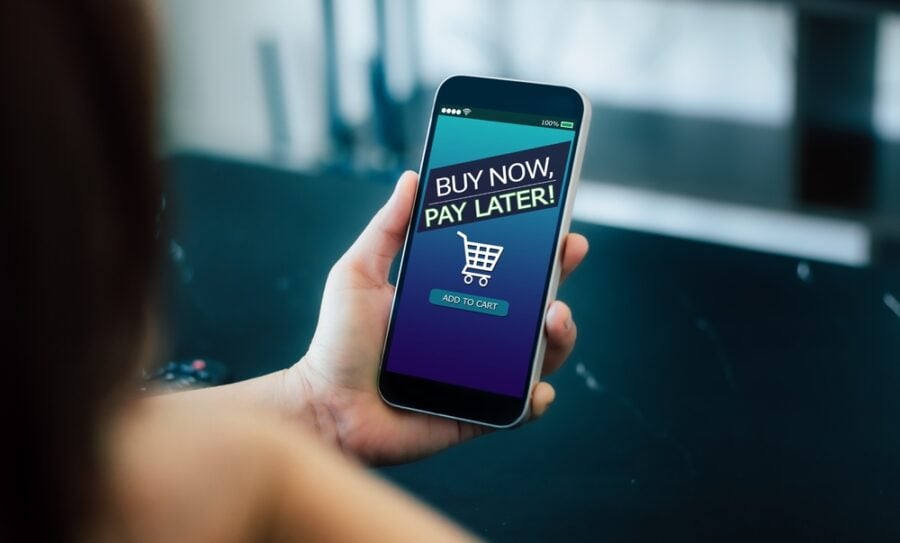In the past year, the BNPL (Buy Now Pay Later) method went on a high growth curve globally, as well as regionally.
tabby was the region’s first Buy Now Pay Later solution, helping retailers across the UAE and KSA boost their sales by offering their customers flexible payment solutions.
At the end of July 2021, tabby raised $50 million in a new equity round which valued the company at $300 million.
But the company is now joined by a number of players, each contending to bankroll consumers on a short-term basis, earning them fees from shop owners who are watching their sales grow.
And now, global payment solutions providers, like Mastercard, are throwing their weight around in this new arena.
What is BNPL and how does it work?
If buying now and paying later sounds too much like what a credit card does, you are not wrong, only there are new twists in a BNPL transaction.
This fintech space is framed as an interest-free alternative to credit card payments.
When making a purchase with BNPL-enabled merchants, consumers typically put down up to 25% of the purchase price, then pay off the rest in around 4 equal interest-free installments.
This method of payment is not restricted to buying online or in-store. Included today are HVAC repairs, plumbing, and other consumer repair and reuse verticals.
Merchants partner with fintech companies to whom they pay a fee in the hope that consumers will make more purchases if they can spread out payments. Fintech, banks, and credit card issuers are today offering their retailer networks similar fee-based versions of these types deals.
Risks involved
The risks are not only born by BNPL service issuers who may not recover the amounts they loan consumers who could fail to pay, but also by consumers as well.
BNPL transactions are labeled short-term point of sale loans. The risk for consumers is if they fail to make these loans in a timely fashion, as fees and interest charges begin to kick in.
There is also the risk of overspending anywhere from 10-40% more on items, according to some estimates, because the purchases are easier to make.
That’s where the BNPL starts to resemble a credit card.
Appetite for BNPL grows
Last August, Square, now renamed Block announced plans to spend $29 billion towards acquiring Australian company ‘Afterpay.’
More recently, PayPal acquired Japan’s Paidy for $2.7 bn, and Amazon reached an agreement with Max Levchin’s Affirm, all being BNPL players.
Over 40% of American shoppers have used this payment method according to a recent Credit Karma/Qualtrics survey, with the highest usage among Gen Z and younger millennials.
BNPL Saudi
According to Research and Markets, BNPL payments in Saudi are expected to grow by 81.2% annually to reach $637 million in 2022, and at 42.4% annually during 2022-2028.
This payment’s Gross Merchandise Value (GMV) in the kingdom will rise from $351.3 million in 2021 to reach $5.3 billion by 2028.
Over 80% of consumers indicate keenness to make use of BNPL services in the country, according to a Q4 2021 Global Market Survey.
BNPL UAE
According to the Q4 2020 BNPL Survey, BNPL payment in the country is expected to expand by 52.6% annually to reach about $510 million in 2021.
A 17.8% annual growth is expected between 2021-2028. The BNPL GMV in the UAE will grow from $334.9 million in 2020 to reach $1.6 billion by 2028.
A more recent Research and Markets study calculates these payments in the UAE exceeded $1.8 billion in 2022.
It expects a 45.9% annual growth rate during 2022-2028, and the BNPL GMV in the country to increase from $ 962.2 million in 2021 to reach $17.5 billion by 2028.
Saudi-based Tamara and UAE’s Spotii, Tabby, and Postpay all say BNPL acceptance has far exceeded initial expectations.
Mastercard UAE, Saudi
According to recent media reports, the Mastercard Installments BNPL program is expected to go live.
It will give banks, lenders, fintech companies, and wallets the ability to offer these type of experiences to merchants.
Seamless integration into Mastercard’s trusted network will enable merchants to quickly offer secure BNPL solutions backed by the security and peace of mind that comes with Mastercard.
Mastercard is reportedly planning to work on the BNPL program with local banks. These include Abu Dhabi Commercial Bank (ADCB), Network International, National Bank of Ras Al Khaimah (RAKBANK) in the UAE, and Saudi National Bank (SNB) in Saudi Arabia.








